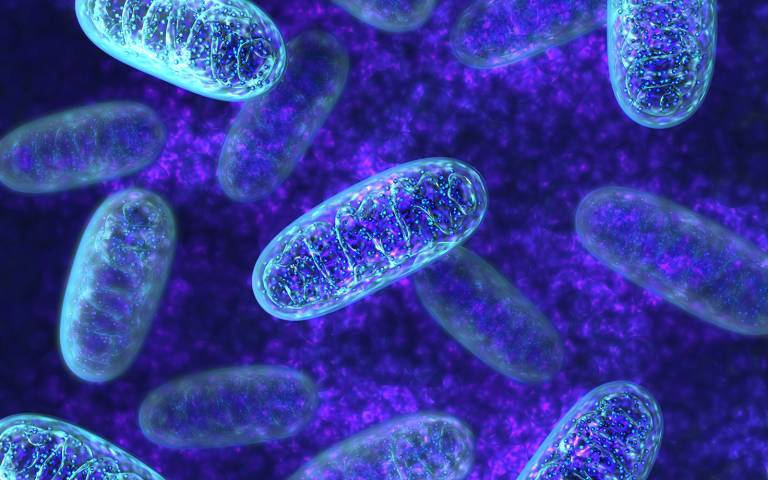UCL researchers contribute to a multidisciplinary study to better understand bipolar disorder
19 September 2023

A team of researchers, led by Professor Hilary Blumberg, MD, Yale School of Medicine, is studying the connection between bipolar disorder and the role of mitochondria in the brain.
Mitochondria are the energy powerhouses of cells, and the team is investigating how they contribute to the low energy symptoms of depression and high energy symptoms of mania.
To support this research, Professor Ilias Tachtsidis and his team from UCL Medical Physics and Biomedical Engineering have installed an optical neuroimaging instrument called broadband-NIRS at Yale. This instrument allows for brain oxygenation and mitochondrial function to be imaged during brain activity.
“For the first time, we will be able to investigate the connection between Bipolar Disorders and mitochondrial dysfunction in these patients to understand mechanisms and support future interventions. We are very excited to be part of this project and collaborate with our Yale colleagues." said Prof Tachtsidis, Professor in Biomedical Engineering
The study forms part of an $18 million research grant from BD² Breakthrough Discoveries for thriving with Bipolar Disorder, a research funding initiative which brings together researchers, clinicians, philanthropists, and people with lived experience to study and treat bipolar disorder. Each awardee, including Harvard, Stanford and the New York GenomeCenter, will receive grants of up to $4.5 million over three years from the BD² Discovery Research programme to examine the fundamental mechanisms of bipolar disorder.
Principal Investigator, Prof Blumberg, who is the John and Hope Furth Professor of Psychiatric Neuroscience and Professor of Psychiatry, at the Yale Child Study Centre and of Radiology and Biomedical Imaging, commented:
“This BD² support will provide us unique opportunities to study the same individuals with bipolar disorder with new ways to scan their brains to examine brain circuitry function and metabolism and, in brain cells derived with recent stem cell technologies from their blood samples, study individual genetic and molecular mechanisms involved and how they respond to specific medications,” Blumberg continued: “The unprecedented opportunities for researchers to perform this work in the context of the highly collaborative larger BD² network we think has potential to be transformative in elucidating causes of BD and in generating more effective diagnostic and treatment methods.”
In a unique multidisciplinary effort, the team will focus on studying mitochondria in relation to bipolar disorder. The team will explore the genetic and molecular mechanisms, as well as how they affect brain cell metabolism and function, and overall brain circuitry and symptoms. The research aims to expand knowledge on the biology of bipolar disorder and ultimately lead to the development of pharmacological treatments and behavioural interventions.
Professor Joy Hirsch, the Elizabeth Mears and House Jameson Professor of Psychiatry, Comparative Medicine, and Neuroscience at Yale School of Medicine and Professor of Neuroscience at UCL Medical Physics and Biomedical Engineering, is collaborating on the study and commented:
“This UCL/Yale investigation aims to test the groundbreaking hypothesis that mitochondrial function is impaired in bipolar disorders. The studies will be performed at Yale under the direction of Prof Hilary Blumberg, MD, using state-of-the-art equipment and techniques that were designed in the laboratory of UCL’s Prof Ilias Tachtsidis. The project employs next generation optical imaging technology that extends functional near-infrared spectroscopy (fNIRS), also developed at UCL, by coupling hemodynamic (fNIRS) and metabolic (broadband NIRS) measures of brain function. The fortunate circumstances leading to this landmark joint venture include the long-standing collaborative agreement between UCL and Yale that has contributed to the development and application of related optical imaging technologies.”
BD² Breakthrough Discoveries for thriving with Bipolar Disorder is the first organisation focused on funding and advancing research and care for bipolar disorder on a global scale.
“The Discovery Research program is the cornerstone of BD²’s work to improve understanding so that we can more effectively diagnose and improve treatment for the tens of millions of people living with bipolar disorder,” commented Dr Cara Altimus, Managing Director for BD² and Senior Director at the Milken Institute, a non-profit economic think tank. “These teams of scientists will work within their own institutions and collaborate across teams to explore hypotheses on the biological causes of bipolar disorder.”
Links
- Professor Hilary Blumberg’s academic profile
- Professor Ilias Tachtsidis's academic profile
- Professor Joy Hirsch’s academic profile
- Dr Cara Altimus’ academic profile
- BD²: Breakthrough Discoveries for thriving with Bipolar Disorder
- Yale Child Study Centre
- Milken Institute
- Metabolight
 Close
Close

